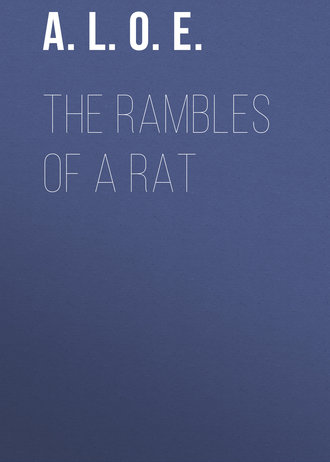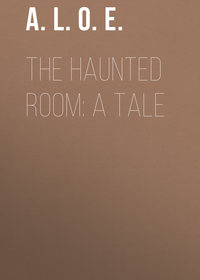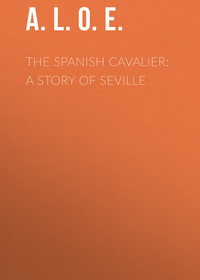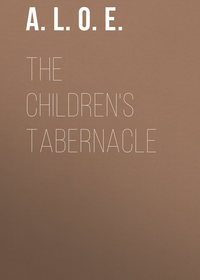 полная версия
полная версияThe Rambles of a Rat

A. L. O. E.
The Rambles of a Rat
PREFACE
Let not my readers suppose that in writing The Rambles of a Rat I have simply been blowing bubbles of fancy for their amusement, to divert them during an idle hour. Like the hollow glass balls which children delight in, my bubbles of fancy have something solid within them, – facts are enclosed in my fiction. I have indeed made rats talk, feel, and reflect, as those little creatures certainly never did; but the courage, presence of mind, fidelity, and kindness, which I have attributed to my heroes, have been shown by real rats. Such adventures as I have described have actually happened to them, unless they be those recorded in the 19th chapter, for which I have no authority. For my anecdotes of this much-despised race I am principally indebted to an interesting article on the subject which appeared in the “Quarterly Review.”
I would suggest to my readers how wide and delightful a field of knowledge natural history must open to all, when there is so much to interest and admire even in those animals which we usually regard with contempt and disgust. The examination of the wondrous works of nature is a study elevating as well as delightful; for the more deeply we search into the wonders around us, the more clearly we discover the wisdom which is displayed even in the lowest forms of creation!
A. L. O. E.CHAPTER I
THE FAMILY OF RATS
My very earliest recollection is of running about in a shed adjoining a large warehouse, somewhere in the neighbourhood of Poplar, and close to the River Thames, which thereabouts is certainly no silver stream.
A merry life we led of it in that shed, my seven brothers and I! It was a sort of palace of rubbish, a mansion of odds and ends, where rats might frolic and gambol, and play at hide-and-seek, to their hearts’ content. We had nibbled a nice little way into the warehouse above mentioned; and there, every night, we feasted at our ease, growing as sleek and plump as any rats in the United Kingdom.
We were of an ancient race of British rats, my seven brothers and I. It is said that our ancestors came over with the Conqueror, William; and we are not a little proud of our Norman descent. Our smaller forms, sleek black coats, long tails, and fine large ears, make us altogether distinct from the Norwegian brown rat, on which we look with – I was going to say with contempt, but I rather think that it is quite another feeling, and one to which neither rats nor men generally like to plead guilty. I know that we do not usually choose to keep company with them; but whether it be because their forms are coarser, their manners less refined, and their pedigree not so long, or whether it be because they sometimes have a fancy to nibble off the ears of their neighbours, or, when their appetite is uncommonly sharp, make a meal of their Norman cousins, we need not particularly inquire.
I said that I and my seven brothers were black rats; but I ought to make one exception. The youngest of the family was piebald – a curious peculiarity, which I never noticed in any other of our race. Yes, he was piebald; and not only had he this misfortune, but he was the clumsiest and most ill-shaped rat that ever nibbled a candle-end! Now, this was no fault of his, and certainly was no reason why he should have been despised by his more fortunate brothers. Man, of course, as a superior creature, would only look with kindness and pity upon a companion so unhappy as to have personal defects. He would never ridicule a condition which might have been his own, nor find a subject for merriment in that which to another was a cause of annoyance; but we were only inconsiderate young rats, and there was no end to our jokes on our piebald comrade. “Oddity,” “Guinea-pig,” “Old Spotty,” and “Frightful” – such were the names which we gave him. The first was that by which he was best known, and the only one to which he chose to answer. But he was a good-humoured fellow, poor Oddity, and bore our rudeness with patience and temper. He pursued the plan which I would recommend to all rats in his position: he joined the mirth which his own appearance raised; and when we made merry at the awkward manner in which he waddled after his more light-footed companions, he never took it amiss, nor retired into a corner of the shed to sulk, amidst rope-ends and bits of rusty iron.
I have said that we had merry nights in the warehouse. Often has the moon looked in through the dull, many-paned windows, lighting our revels; though we cared little for light, our delicate feelers almost supplying the place of eyes. But one night above all nights I remember!
There had been a great deal of moving about in the warehouse during the day, running of trucks, and rolling of casks. Brisk, the liveliest of my brothers, had sat watching in a hole from noon until dusk, and now hurried through our little passage into the shed, where we were all nestling behind some old canvass. He brought us news of a coming feast.
“A ship has arrived from India,” said he, “and we’ll have a glance at the cargo. They’ve been busy stowing it away next door. There’s rice – ”
The brotherhood of rats whisked their tails for joy!
“Sugar – ”
There was a universal squeak of approbation.
“Indigo – ”
“That’s nothing but a blue dye obtained from a plant,” observed Furry, an old, blind rat, who in his days had travelled far, and seen much of the world, and had reflected upon what he had viewed far more than is common with a rat. Indeed, he passed amongst us for a philosopher, and I had learnt not a little from his experience; for he delighted in talking over his travels, and but for a little testiness of temper, would have been a very agreeable companion. He very frequently joined our party; indeed, his infirmities obliged him to do so, as he could not have lived without assistance. But I must now return to Brisk, and his catalogue of the cargo.
“Opium – ”
“The juice of the white poppy,” said our aged friend, who had a taste for general information. “I’ve seen it produce strange effects when eaten in large quantities by men.”
“What effects?” said I. I was a very inquisitive rat, and especially curious about all that related to the large creatures upon two legs, called Man, whom I believed to be as much wiser as they are stronger than the race of Mus, to which I belong.
“Why, opium makes men first wild and bold, so that they will rush into danger or run into folly, quarrel with their friends and fight their foes, laugh and dance, and be merry they know not why. Then they grow sleepy, and though their lives might depend on it, not a step would they stir. Then, when they awake from their unnatural sleep, their bodies are cold, their heads heavy; they feel sick, and faint, and sad! And if this should happen day after day, at last the strong grows weak and the healthy ill, the flesh goes from the bones and the life from the eyes, and the whole man becomes like some old, empty hulk, whose timbers will hardly hold together! And all this from eating opium!”
“Ugh!” exclaimed Brisk; “leave opium to man; it is a great deal too bad for rats!”
CHAPTER II
A CLAP-TRAP DISCOVERY
With eager haste we scrambled into the warehouse, Furry, as usual, remaining behind on account of his infirmities. We were almost too impatient to wait till the men within should have finished their work, till the doors should be shut and locked, and the place left in quiet for us.
I soon found out what was to me a singular curiosity – a tooth; I felt certain that it was a tooth; but it was twice as long as any rat, counting from the tip of his nose to the end of his tail! I could not help wondering in my mind to what huge animal it could ever have belonged.
“Isn’t that called ivory?” said Oddity, as he waddled past me.
I felt inexpressible pleasure in gnawing and nibbling at the huge tusk, and polishing my sharp teeth upon it. “How I should like to see the enormous rat that could have carried such a tusk!” I exclaimed. “Oh! how I should delight in travelling and seeing the world!”
“You’ve something to see worth the seeing, without travelling far!” cried Brisk. “Such a fragrance of cheese as there is yonder! Why, Ratto, its delicious scent reaches us even here!”
I was so busy with my tusk and my reflections, that I scarcely looked up; but Oddity turned his eyes eagerly towards the spot.
“Now, I propose that we have a race to the place!” cried Brisk; “and he who gets first shall have his pick of the feast! Leave Ratto to his old bone! Here are seven of us: now for it; once, twice, thrice, and away!”
Off they scampered helter-skelter, all my seven brothers, awkward heavy Oddity, as usual, in the rear. He had often been laughed at for his slowness, but this time it was well for him that he was slow! On rushed the six foremost, almost together, scrambling one over another in their haste; they disappeared into what looked like a dark hole, and then – alas! alas! what a terrible squeaking!
Poor unhappy brothers! all caught in a trap! All at the mercy of their cruel enemy, man! I ran to the spot in a terrible fright. Nothing of my six companions could I see; but Oddity, with a very disconsolate look, was staring at the drop of the trap. His had been a very narrow escape, – it had grazed his ugly nose as it fell!
This is a very melancholy part of my story, and I will hasten over it as fast as I can. In vain the poor captive rats tried to gnaw their way to freedom from within, while Oddity and I nibbled from without. There was something which defied even our sharp little teeth, and all our efforts were in vain. My poor brothers could not touch the fatal feast which had lured them to their ruin! They passed a miserable night, and were every one carried off in a bag to be worried by dogs in the morning!
“Cruel, wicked man!” I exclaimed, as with my piebald companion I sought my old shelter behind the canvass in our shed. My exclamation was overheard by old Furry.
“Cruel, wicked man!” he repeated, but in a different tone from mine; “well, I think that even when setting a trap to catch inexperienced rats, man may have something to say for himself. I have often noticed the big creatures at work, and much they labour, and hard they toil, and we can’t expect them to be willing to take so much trouble to collect dainties just to feast us! Those who live on the property of others, like rats, have no right to expect civil treatment!”
“Are there any creatures that lay traps for man?” said I, in the bitterness of my spirit almost hoping that there might be.
“As well as I can understand,” replied Furry, “man himself lays traps for man. I have seen several of these traps. They are large, and generally built of brick, with a board and gilt letters in front. They are baited with a certain drink, which has effects something like opium, which destroys slowly but surely those who give themselves up recklessly to its enjoyment.”
“Well,” cried Oddity, “having once seen what comes of running into a trap, I, for one, shall be always on my guard against them, and am never likely to be caught in that way. I suppose that it is the same with man. When he sees that one or two of his companions are lost by the big man-trap, he takes good care never to go near it himself.”
“Not a whit!” exclaimed Furry, with a scornful whisk of his tail. “They like the bait, though they know its effects quite well. They walk with open eyes into the great man-trap, they hasten merrily into the great man-trap, when the gas-lights are flaring, and the spirits flowing, and the sound of laughter and jesting is heard within! They know that they are going the straight, direct way to be worried by sickness, poverty, and shame, (what these are I never heard clearly explained, but I have gathered that they are great enemies of man, who are always waiting at the door of the great man-trap,) and yet they go gaily to their ruin!”
“So this is your account of the wise creature man!” I exclaimed; “he is a great deal more foolish than any rat!”
CHAPTER III
POORER THAN RATS
We had not our shed always to ourselves. One cold evening in autumn, when there was a sharp east wind, and a drizzling rain, two human creatures came into the place and cowered down in a corner of our shed. I call them human creatures, for they certainly were not men; they were so different from the tall powerful fellows whom I had occasionally seen at their work in the warehouse. These were much smaller, and so thin that their bones seemed almost ready to break through the skin. Their hair hung in long loose masses about their ears. They had nothing on their feet to protect them from the stones, and one of them had a hurt upon his heel, which looked red and inflamed.
I found that these were young human beings, neglected and uncared for, as young rats would not have been. We were at first afraid of them, and only peered out curiously upon them from our holes and hiding-places; but when, gathering courage, we ventured to come forward, we seemed to frighten them as much as they had frightened us.
“Look there – there, Bob!” screamed the younger child, clinging more closely to his brother.
“Them bees rats,” said the other one more quietly. His poor thin little face looked as if the life and spirit had been so starved out of it, that he could not be much astonished at anything.
“I don’t like staying here, Bob, amongst the rats!” cried the terrified little one, attempting to pull his brother towards the entrance by the sleeve of his jacket. The wretched rag gave way even under his weak pull, and another rent was added to the many by which the cold crept in through the poor boy’s tattered dress. “I won’t stay here; let us go, let us go!”
“We’ve no-wheres to go to,” replied Bob, in the same dull, lifeless tone. “Never you mind the rats, Billy, them won’t hurt you,” he added.
Hurt him! not we! If ever I felt pity it was for those ragged little urchins. We were well-fed, but they were hungry; Nature had given us sleek warm coats, but they trembled with cold. It was very clear that it was much harder to them to support life than if they had been rats. I wondered if in this great city there were many such helpless children, and if there were none to care for them!
“I say, Ratto,” observed Oddity, licking his soft coat till the beautiful polish upon it made one almost forget its ugly colour, “’tis a pity that these children are so dirty; but may be they are not so particular about such matters as we rats.”
In time a sort of acquaintance grew up between me and the ragged boys. We ceased to fear each other, and I would venture almost close to Billy’s thin little hand when he had a crust of bread to eat, for he always broke off a little bit for me. The poor little fellow was crippled and lame, so he rarely left the shed. Bob often went out in the morning, and returned when it was growing dark, sometimes with food, and sometimes without it; but whenever he had anything to eat, he always shared it with his little lame brother. I see them now, crouched close up together for the sake of warmth. Sometimes Billy cried from hunger and cold, and his tears made long lines down his grimy face. Bob never cried, he suffered quite quietly; he patted his little brother’s shaggy head, and spoke kindly to him, in his dull, cheerless way. I felt more sorry for him than for Billy.
The little one was the more talkative of the two. Perhaps he was more lively in his nature; or perhaps, from having been a shorter time in a world of sorrow, he had not learned its sad lessons so well. I certainly never heard him laugh but once, and then it was when Oddity, who was more shy than I, ventured for the first time since Billy’s coming to cross the shed.
“Oh! look – look, Bob! what a funny rat! what a beauty rat!” he cried, clapping his bony hands together with childish glee.
It was comical to see the expression on Oddity’s blunt face on hearing this unexpected compliment, perhaps the first that he had ever received in his life. It was enough to have turned the head of a less sober rat; but he, honest fellow, only lifted up his snub nose with a sort of bull-dog look, which seemed to say, “Well, there’s no accounting for taste.”
“Bob,” said little Billy one evening, with more animation than usual, “I’se been a-watching the rats, and I saw – only think what I saw!”
“Eh, what did ye see?” replied Bob, drowsily, rubbing his eyes with the back of his hand. He looked very hungry and tired.
“I was a-watching for the fat spotted one which ran across yesterday, when out came creeping, creeping, two others” – the child with his fingers on the floor suited his action to his words, – “and one had some white on its back; it looked old and weak; and Bob, I saw as how it was blind.”
“A blind rat!” cried Bob; “’twould soon starve, I take it.”
“But there was the other rat at its side, with such shining eyes, and such a sharp little nose!” I plead guilty to vanity; I could not hear such a description of myself with Oddity’s sober composure. “And the old blind rat had a little bit of stick in its mouth, just as the blind man in the lane has a stick in his hand, and the pretty black rat took the other end in his teeth, and so pulled the old un on his way.”
“I’se never heard of rats doing that afore,” said Bob.
“That’s not all that I saw about ’em,” continued Billy. “Out comes the funny spotted rat from its hole; so I keeps very quiet, not to frighten it away. And it pattered up to the place where I put the little crumbs; and what do you think as it did?”
“Ate them,” was Bob’s quiet reply.
“No, but it didn’t though!” cried Billy, triumphantly; “it pushed them towards the old blind rat. Neither the black un nor the spotted un ate up one crumb; they left ’em all for the poor blind rat! Now wasn’t them famous little fellows!”
“So rats help one another,” said Bob. He did not speak more; but as he leant back his head, and looked straight up at the roof of the shed, (there was a great hole in it which the stars shone through, and now and then a big drop of water from the top came plash, plash, on the muddy floor below,) he looked up, I say, and I wonder whether he was thinking the same thing as I was at that moment: “Rats help one another; do none but human beings leave their fellow-creatures to perish!”
CHAPTER IV
HOW I MADE A FRIEND
I always ate my supper in the warehouse, but I need hardly say that Oddity and I carefully avoided the spot where the tragedy of our six brothers had occurred. We were by no means the only rats who found a living in the place at the expense of our enemy, man. There were a good many of the species of the large brown Norwegian rat; but as I have mentioned before, we usually kept out of their way, from a tender regard for our own ears.
There was one brown rat, however, whose fame had spread, not only in his own tribe, but in ours. For quickness of wit, readiness in danger, strength of teeth, and courage in using them, I have never yet met with his equal. Whiskerandos was a hero of a rat. Was it not he who in single combat had met and conquered a young ferret! an exploit in itself quite sufficient to establish his fame as a warrior. They had been opposed to each other in a room lighted by a single window. Whiskerandos, whose intelligence at once showed him the importance of position, took his station beneath this window, so that the light was in his enemy’s eyes, and compelled him to fight at disadvantage. For two long hours the battle lasted, but at length the ferret lay dead upon the floor!
Several scars upon the neck of Whiskerandos bore witness to this terrible encounter, and many others in which he had been engaged. He had lost one ear, and the other had been grievously curtailed of its proportions, so that altogether he had paid for fame at the price of beauty; but he was strong and bold as ever, and his appearance one night in our warehouse created quite a sensation in the community of rats.
There was one brown rat, in particular, that seemed to wait upon him, and pay him court, as though, having no merit of his own, Shabby fancied that he could borrow a little from a distinguished companion. I have often seen this in life, (I am now an old and experienced rat,) I have seen a mean race following and flattering their superiors, ready to lick the dust from their feet, not from real admiration or attachment, but, like a mistletoe upon a forest tree, because they had no proper footing of their own, and liked to be raised on the credit of another. It is easier to them to fawn than to work, to flatter the great than to follow their example.
I own that I was afraid of Whiskerandos, and yet he passed without touching me, quite above the meanness of hurting a creature merely because it was weaker than himself. But Shabby gave such a savage snap at my ear that I retreated squeaking into a corner. I almost think that I should have returned the bite, had not his formidable companion been so near; and it was probably this circumstance which gave the mean rat courage thus to attack me without provocation. From what I have heard of boys tormenting cats, mice, birds, anything that they can easily master, while they pay proper respect to bulldogs and mastiffs, I have an idea that there are some Shabbys to be found even amongst “the lords of creation.”
I was busy at my supper, when, chancing to look towards the fatal hole in which my six brothers had been caught, I saw Whiskerandos and his follower merrily advancing towards it, doubtless attracted, as the former victims had been, by a very enticing scent.
I do not know how man would have behaved in my position. These certainly were no friends of mine; but then they were rats; they were of the race of Mus. I could not see them perish without warning them of their danger.
“Stop! stop!” squeaked I, keeping, however, at a respectful distance; “you are running right into a trap!”
Whiskerandos turned sharp round and faced me. I retreated back several steps.
“Bite him, – fight him, – shake him by the neck!” cried Shabby; “he knows there is a dainty feast there, and he would keep it all for his ugly black rats!” Shabby was a great fighter with words; those of his character usually are; nor was he in the least particular, when he gave his bad names, that they were in the least suitable and appropriate, or he would never have applied the term “ugly” to us.
“You’ll pay for your dainty feast if you go one foot farther!” I exclaimed; feeling, I confess it, very angry.
“Who’s afraid!” cried the boaster, flinging up his hind legs with a saucy flourish as he scampered on. Clap! he was caught in the trap!
Poor rat! had he possessed the courage and skill of Whiskerandos himself, they would have availed him nothing. His miserable squeaking was louder than that of all my six brothers put together. He would not take advice, and he found the consequences. He thought himself wiser than his neighbours, and only discovered his mistake when it had led him to destruction. Had he only listened to the counsels of a little black rat!
Whiskerandos remained for some moments quite still, looking towards the dismal prison of his companion. He knew too well that it was impossible to rescue him now. Then, with such bounds as few rats but himself could make, he sprang to where I was standing.
“Rat!” he exclaimed, “you have saved my life, and I shall never forget the obligation. Though you are black and I am brown, no difference between us shall ever be regarded. Let us be friends to the end of our days!”
“Agreed!” I cried; “let’s rub noses upon it!” and noses we accordingly rubbed.
He never flinched from his word, that bold Whiskerandos. I never feared him from that hour; no, not even when I knew that he was hungry, and had tasted no food from morning till night; I knew that no extremity would ever induce him to eat up his friend; and many a ramble have we had together, and through many strange paths has he led me. I ventured even into the haunts of the brown rats, for his presence was a sufficient protection. None would have dared to attack me while he was beside me, – I should hardly have been afraid of a cat!
I had naturally a fancy for roving, and a great desire to know more of the world; and what better guide could I have had than the heroic Whiskerandos? He had not, however, been so great a traveller as Furry, – he had never yet crossed the water; but he and I determined, on some favourable opportunity, to take our passage in a ship, and explore some foreign region together.





